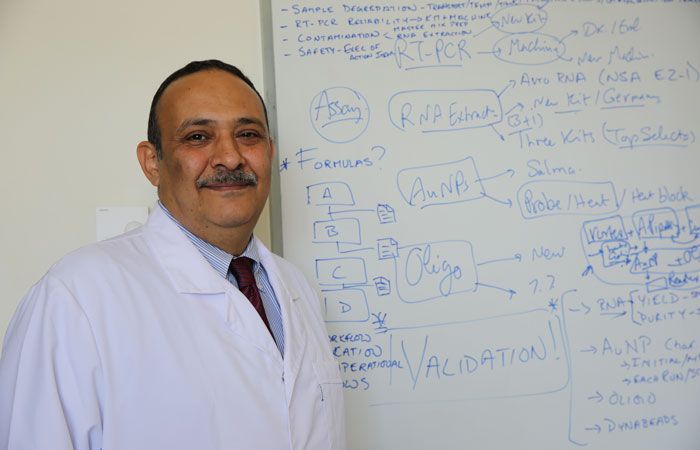GSBS students are transforming lives — and the world
By Betsy Friauf

Since its first class graduated in 1994, these 2,250 alumni have:
- Blazed trails in research
- Educated thousands of students, from elementary schoolers to post-docs
- Made communities stronger and healthier, the world over
A prime example is Hassan Azzazy, PhD, Professor of Chemistry at the American University in Cairo, Egypt. He leads the university’s research group on novel diagnostics and therapeutics. As noted in a 2014 UNTHSC alumni newsletter, Azzazy patented a faster and less expensive way to detect hepatitis C, a virus that infects nearly one in five people in his native Egypt.
Azzazy teaches biotechnology (use of biological processes for industrial and other purposes, especially genetic manipulation of microorganisms to produce antibiotics, hormones and the like) and nanotechnology (technology using extremely small microscopic matter such as atoms and molecules).
It’s not only research and new patented ways of finding and treating illness that differentiates our GSBS grads. They also are physician scientists who work in public health, and they fill positions in health science centers similar to our own, as well as other colleges and universities, plus community health centers, federal agencies and industry. They lead or manage clinical trials in hospitals and other settings. In addition to laboratory work, many interact with the public regularly.
“We’ve shifted the curriculum to be more competency-based,” said Academic Program Specialist Meagan Cross. “Far beyond memorizing information, our students have to be proficient in scientific communication so they can explain the science just as well to a layperson as to another scientist. They will need to know how to write for a scientific journal — and also for the press or the public.”
The “Med Sci” program helps students improve their qualifications for applying to medical, or dental, PA, or veterinary school. In Just one year, students earn a master’s degree in Biomedical Science. But not all choose to become health care professionals. “Some alumni of the Med Sci program find that after completing the program, they no longer desire to go to medical school,” said Cross. “Some teach at the community college or K-12 science programs, while others choose a career in industry.”
GSBS has amped up its recruitment. “Attracting PhD students is different from medical or PA or PT students, where there are several hundred applying for 200 slots or so,” Cross said. “GSBS students work in a lab and are paid a stipend — which we’ve increased to be more competitive — and we also pay tuition and fees. So we are heavily invested, literally, in our students’ education.”
Students also may assist with teaching by serving as Teaching Assistants for certain classes, or teach in more informal ways, such as teaching lab techniques and protocols to the newer students.
The dividends to society are enormous. In addition to his hepatitis C work, Azzazy has done research on markers of cardiac injury and tuberculosis.
He recommends the UNTHSC Graduate School of Biomedical Sciences: “It provides a strong foundation in biomedical research which enables graduates to join diverse biomedical research groups in academia or industry.”
He also advises students: “Capitalize on this knowledge and develop innovative solutions to global health challenges, and develop ‘soft skills’ in entrepreneurship.”





Social media